| World |
| A New Start | |
| At 70, relations between China and Russia have reached a new height and yielded tangible results | |
|
|
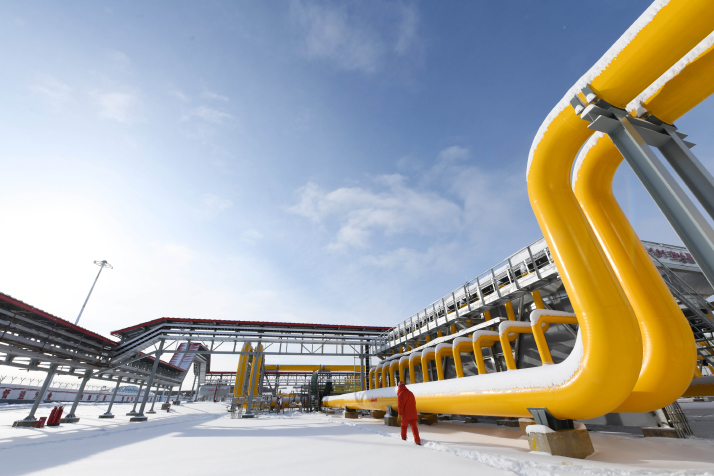 A worker passes by the China-Russia east-route natural gas pipeline at the Heihe Station in Heilongjiang Province, the first station in China along this pipeline, on November 19 (XINHUA)
An exciting moment in the history of China-Russia relations took place on December 2, as a Chinese representative at the Heihe Station reported that it was ready to receive natural gas and Russian representatives at the Atamanskaya compressor station and Chayandin gas field announced they were ready to provide it. Chinese President Xi Jinping and Russian President Vladimir Putin then issued the order for the official launch of the China-Russia east-route natural gas pipeline. Starting in Siberia, Russia, the pipeline enters China at Heihe in bordering Heilongjiang Province. Then it stretches across northeast China and through Hebei, Tianjin, Shandong and Jiangsu, to reach Shanghai. It will connect to existing regional gas transmission pipeline networks in China and supply natural gas to the areas along the line. In the next 30 years, a total of 1 trillion cubic meters of natural gas will be transported from Russia to China, according to a contract signed between the China National Petroleum Corp. and Russian state gas company Gazprom in 2014. "The east-route natural gas pipeline is a landmark project of China-Russia energy cooperation," Xi said in a video call to Putin during the pipeline's launch ceremony. He added that it will boost the sustainable development of the regions along its path and called for similar joint key projects to be initiated by the two countries. During the video call, Putin said the launch has lifted bilateral strategic coordination to a new level. The pipeline was inaugurated on the 70th anniversary of China-Russia diplomatic ties. In June, before attending a gathering in Moscow to mark the anniversary, Xi and Putin signed a joint statement to upgrade bilateral relations to a comprehensive strategic partnership of coordination for a new era. 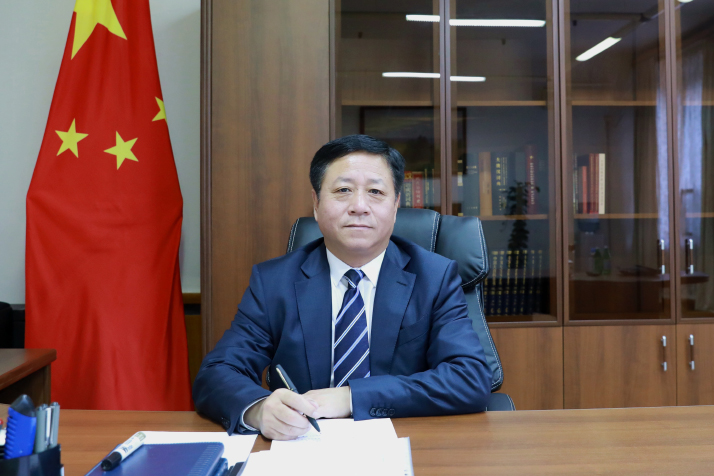 Chinese Ambassordor to Russia Zhang Hanhui (COURTESY PHOTO)
A natural affinity The top leaders of the two countries are in close contact with each other, not only discussing state affairs, but also sharing personal interests, creating role models for the general public and further boosting people-to-people exchanges, Xie Hua, General Manager of Greenwood Travel and Exhibition Co. Ltd., told Beijing Review during a tour of the Greenwood Business Park. He said he senses enhanced understanding between Chinese and Russian people and an improving business environment in Russia. The park is located on the outskirts of Moscow and provides office space and business services to about 200 companies, including nearly 80 Chinese companies, over 100 Russian companies and the rest from other countries, said Ma Rui, a customer service manager at the park. Xie said the two peoples have a natural affinity, not only sharing interests such as revolutionary tourism, but also cultural aspects such as ballet and the Peking Opera. 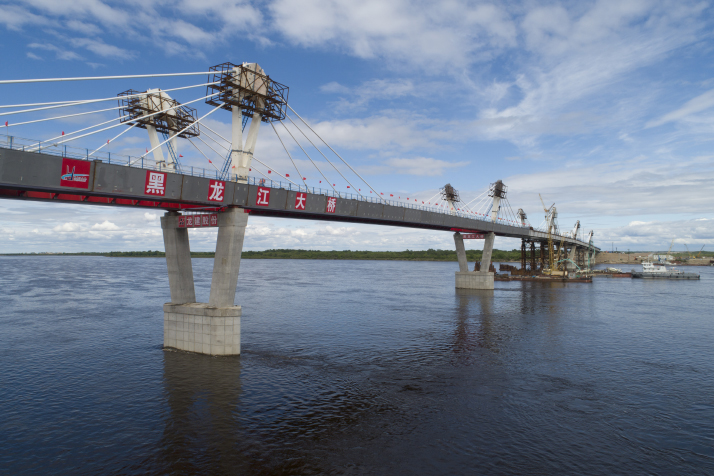 A view of the Blagoveshchensk-Heihe Highway Bridge on May 31 (XINHUA)
He first came to Russia in 1998 as an international student. At that time, his Russian classmates knew little about China, he said, whereas in recent years, especially after the Beijing 2008 Olympic Summer Games, Russians have become better informed about China's development and more friendly to Chinese businesses. In addition, the China International Import Expo (CIIE) held in Shanghai twice over the past two years has shown the rest of the world the Chinese determination to further open up its market. The transaction volume of Russian exhibitors at the Second CIIE in November grew 74 percent from last year, and both sides need to expand bilateral trade, Xi said on November 13, while meeting with Putin in Brasilia, Brazil, on the sidelines of the BRICS Summit 2019. Xie added that this year, he has received hundreds of delegations from various parts of China that want to explore cooperative opportunities with Russia. Moreover, the character of Chinese business people coming to Russia has changed over the years, he said. Those arriving three decades ago were mostly peddling low-cost products, while those who came two decades ago were mainly selling machinery, whereas today, representatives of prominent hi-tech companies are coming in. He said this year, Jack Ma, founder of the Alibaba Group, made a speech at the Moscow State University, promising to create 3,000 jobs in Russia, and many Russian students expressed interest in these jobs. Xie said he is confident that bilateral relations will get even better in the coming decades. 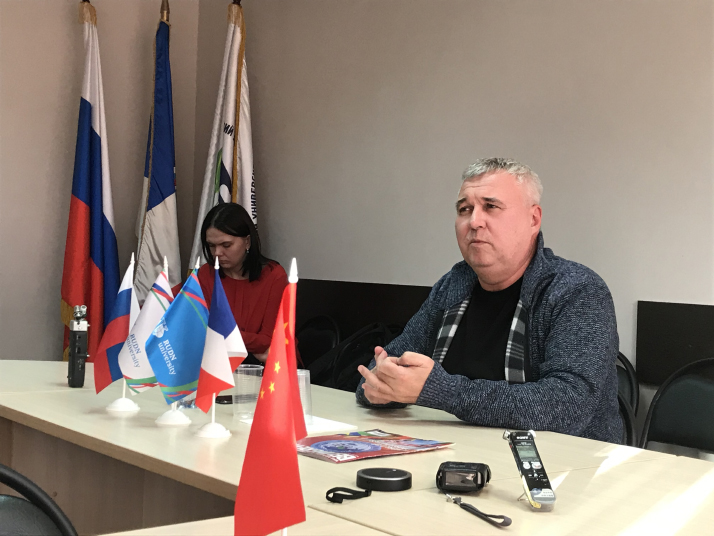 Oleg Timofeev, an associate professor at the People's Friendship University of Russia, fields questions from China International Publishing Group reporters on November 24 (ZHU SHAN)
Tangible results Cooperation between China and Russia has seen new tangible results. Beijing-based BOE Technology Group Co. Ltd. is one of the Chinese companies that have expanded its business in Russia, banking on the amiable relationship between China and Russia and opportunities created by the Belt and Road Initiative. Entering the Russian subsidiary of BOE is like stepping into a world of screens. An incredibly large screen resembling a blackboard was propped up on stands, beaming stunningly beautiful natural scenery; smaller screens were casually lined up against walls displaying fine art masterpieces; and transparent screens on mirror surfaces quietly blinked information such as the weather forecast. "Our Russian subsidiary was set up in 2017, and it mainly engages in marketing," Peng Fei, sales manager of BOE in Moscow, told Beijing Review. "This year, our sales goal in the Russian market is 350 million yuan ($49.68 million), of which 60-70 percent will be in TV sales." Last year, Russia hosted the 2018 FIFA World Cup and in preparation for the event, Moscow decided to upgrade its subway facilities, including installing display panels in subway cars. BOE's Moscow subsidiary won the contract, and to date, the company has supplied about 20,000 display panels. It has also supplied screens for buses and bus stops in Moscow to support the city's efforts to build itself into a smart city, as well as screens used on intercity trains throughout Russia. BOE is an Internet of Things company, which provides intelligent interface products and related services. According to the company, it now has marketing as well as research and development centers in 19 countries and regions, and produces more than one quarter of the display panels in the world. "BOE became the largest display panel manufacturer in the world in the first quarter of the year," Peng said. 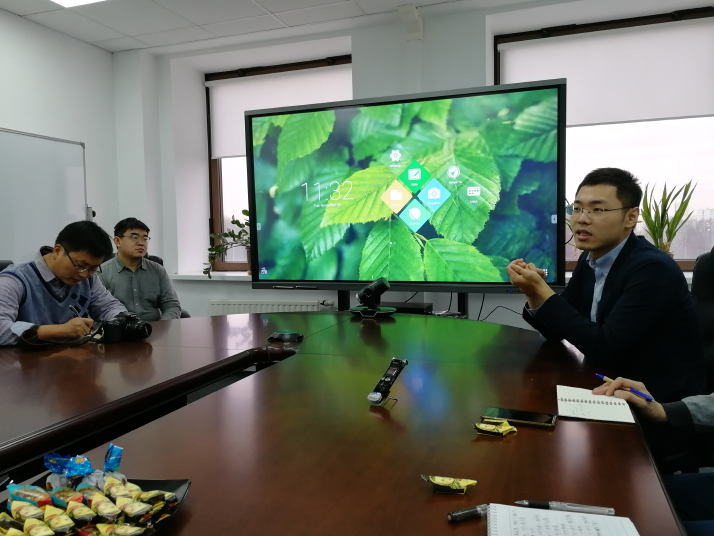 Peng Fei, Sales Manager of the Russian subsidiary of Beijing-based BOE Technology Group Co. Ltd., introduces the company's products to visitors in Moscow on November 26 (WANG HAIRONG)
Progress has also been made in major cooperative projects between the two countries. The Nizhneleninskoye-Tongjiang Railway Bridge, the first cross-border railway bridge between the two nations, is near completion, while the two sides of the Blagoveshchensk-Heihe Highway Bridge were joined in May. Moreover, bilateral trade has been growing briskly. "China-Russia relations are very important to both sides, especially in the current unstable world situation, with economic and trade cooperation an important aspect," Oleg Timofeev, associate professor at the People's Friendship University of Russia, told China International Publishing Group (CIPG) journalists during an interview on November 25. In 2018, bilateral trade volume reached the long-awaited $100-billion mark, and the two sides set the trade target at $200 billion for 2024. "It is gratifying that in recent years, the structure of trade between the two countries has changed. Russia is no longer simply exporting energy products to China; it has begun to export a large number of agricultural products as well. China has a demand for agricultural products, while Russia has rich agricultural resources. This has also promoted the development of Russia," Timofeev noted. The Polar Silk Road is also an initiative of mutual interest, he said, not only promoting cooperation along new navigational routes, but also advancing progress in scientific expeditions in polar areas. The two countries' people-to-people exchanges and cooperation continue to deepen. Universities and even some primary and secondary schools are offering Chinese-language courses, and Chinese language teaching in Russia is consistently improving. This year, the Russian Department of Education and Science listed Chinese as one of the foreign language options that can be tested in Russian college entrance exams, which is a new and encouraging change, he said. During his meeting with Putin in Brasilia, Xi hoped the China-Russia year of scientific and technological innovation to be held in 2020 would have many fruitful outcomes, and called for new progress in the alignment of the Belt and Road Initiative and the Eurasian Economic Union (EEU). In 2018, an agreement on trade and economic cooperation between China and the EEU was signed at the Astana Economic Forum, an international and regional platform for dialogue. At the end of October, Chinese Premier Li Keqiang and prime ministers of EEU member states jointly announced that the agreement had gone into effect. Zhang Hanhui, Chinese Ambassador to Russia, told reporters from the CIPG that the agreement will create a better policy environment for economic integration in the region, and provide institutional guarantee for economic and trade cooperation. With the alignment of the Belt and Road Initiative and the EEU, bilateral cooperation in traditional fields such as energy, aerospace and infrastructure construction has been consolidated, while cooperation in science and technology, agricultural trade, e-commerce, finance and other fields has become a new growth area. The year 2019 is an important juncture and a new historical starting point for China-Russia relations, Zhang said. The two countries will work more closely together to enhance political mutual trust, deepen practical cooperation, strengthen people-to-people and cultural exchanges, and maintain world peace and strategic balance. (Reporting from Moscow, Russia) Copyedited by Rebeca Toledo Comments to wanghairong@bjreview.com |
|
||||||||||||||||||||||||||||
|